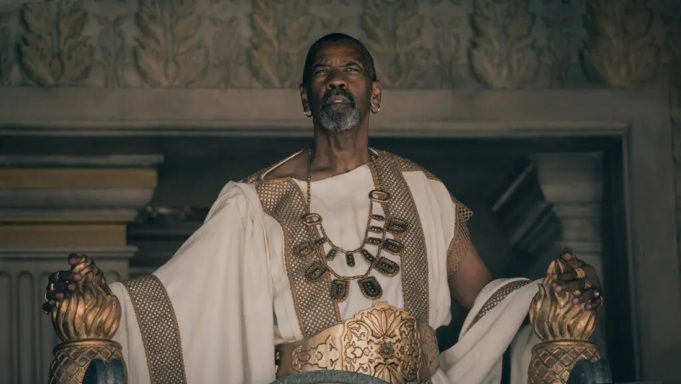I didn’t have the highest hopes for Ridley Scott’s sequel to Gladiator. Granted, I enjoyed his 2000 Roman epic, but his sequels to Alien were roundly underwhelming, and we have to go back to 2015’s The Martian to find the last good movie that he directed. Wouldn’t you know it, though? Every time I’m ready to write off the Englishman, he comes back with something recommendable. Gladiator II (those Roman numerals in the title are entirely appropriate) falls short of his best movies, but it’s good entertainment thanks to a number of factors.
The movie starts in the North African kingdom of Numidia, where Lucius Verus (Paul Mescal) is a military commander who sees the Roman navy bearing down on his homeland and promises his compatriots that they’re a fading empire that can be brushed aside. Turns out even fading empires can pack a wallop, and the Romans slaughter thousands of his fellow soldiers as well as his wife and take him prisoner as a slave. Lucius plots revenge against Marcus Justus Acacius (Pedro Pascal), the general who led the invasion, but Acacius has his own plans to depose the brothers who rule Rome as joint emperors — sadistic Geta (Joseph Quinn) and insane Caracalla (Fred Hechinger) — and restore a fairer government. In a wild series of coincidences, Lucius happens to be the son of Maximus Decius Meridius, the hero of the first movie, and Lucilla (Connie Nielsen), who is now married to Acacius.
As was the case with the original Gladiator, the villain is more interesting than the hero. This is a rare movie where Denzel Washington is not The Guy, and it seems to give him a caffeine jolt. He portrays Macrinus, the rich owner of a stable of gladiators who buys up Lucius to fight for him. An ex-slave himself, Macrinus thinks the whole idea of Rome as a beacon of civilization is a load of crap and that anyone who’s willing to die for the empire is a useful idiot. With his eye for human weakness and total lack of principles, he plays Lucius, generals, senators, and the co-emperors themselves against one another to benefit himself. If Caracalla promotes his pet monkey to a higher position in the government than Macrinus, he’s the first one to salute the monkey. (Well, he might, because a few minutes later, Macrinus shows Geta’s severed head to the senate as a power move.) Whether Macrinus is dubiously quoting Cicero on the subject of slavery or imperiously telling a deep-in-debt senator (Tim McInnerny) how to vote — “I own your house. I would like your loyalty.” — Washington’s gleeful cynicism lifts the entire movie and punctures the high seriousness that has infected Scott’s other recent films. This is one of Denzel’s most enjoyable performances.
To give us a break from all the political maneuvering, Scott continues to stage some creative fight sequences at the Colosseum, one with the gladiators squaring off against a champion riding a rhino and another in a flooded arena with the fighters on boats and sharks swimming in the water. Maybe the best fight sequence is a relatively plain one in a room with the emperors and their wealthy friends looking on as Lucius uses the furniture to take down a larger opponent and convinces Macrinus to buy him.
We do see some footage from the original film with Russell Crowe as Maximus and Derek Jacobi as Gracchus (the character really deserves better than he gets here), but the references to the original aren’t too obtrusive. In fact, the most annoying piece of fanservice isn’t to the original Gladiator but rather to the “I am Spartacus” moment, when Lucius’ fellow gladiators stand up for him after he fails to assassinate the emperors. This sequel manages to be its own thing, and its jaded attitude feels right for the moment.
Gladiator II
Starring Paul Mescal, Pedro Pascal, and Denzel Washington. Directed by Ridley Scott. Written by David Scarpa. Rated R.












